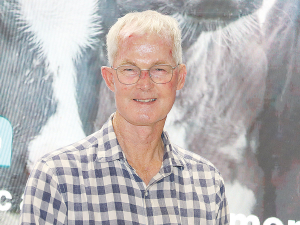NZ food & fibre exports to reach record $62b by 2026
New Zealand's primary sector is set to reach a record $62 billion in food and fibre exports next year.
 DairyNZ chair Jim van der Poel says the latest report shows NZ still relies on agriculture for its wealth.
DairyNZ chair Jim van der Poel says the latest report shows NZ still relies on agriculture for its wealth.
While the numbers in the SOPI report look good and there are positive signs, there are also some headwinds.
The SOPI report singles out the weak NZ dollar as a significant contributor to the good result, saying this has helped offset some of the recent lower prices for our products.
It points to a slowdown of the global economy due to inflation pressure, the Russia/Ukraine conflict and China.
The latter is a big worry because it accounts for a large percentage of our exports.
The report notes that China’s goal of containing Covid-19 appears to have come at a significant economic expense – especially in the second quarter of 2022. It says mobility restrictions have depressed demand and affected supply chains.
On the other hand, it says there are signs of an improvement in shipping times and port delays.
On the home front, the report picks up on the impact of erratic La Nina weather patterns and the affect this has had on pasture growth and in turn milk production. It also highlights its severe impact on the horticulture sector, which has seen crops ruined by floodwaters and caused delays in the planting of other crops such as maize.
Another big concern is the sharp rise in farm expenses. The SOPI report notes the farm expenses price index has increased by 15% in the year to the end of September 2022.
All of this, it would appear, will see farm profits reduced in real terms in the coming 12-months.
For meat there are pluses and minuses. MPI says weaker purchasing power in key markets is likely to put downward pressure on prices as consumers adjust their budgets to the global economic downturn. It notes that sheepmeat and beef prices are already starting to weaken, but adds that with global meat supplies running tight, this may prevent a substantial fall in prices.
The news for dairy is better with the outlook for the coming year good and a suggestion that with the warm weather, pasture growth is picking up and milk production may do the same.
DairyNZ chair Jim van der Poel says the latest SOPI report shows that NZ still relies on the agricultural sector for its wealth.
He pointed out the significance of the fact that more than 80% of NZ’s export earnings come from the ag sector and, despite the challenges in front of the sector, its contribution continues to grow and be the major contributor to our export earnings.
Van der Poel says dairy exports make it possible for Kiwis to buy cars and medicines and all the items that people take for granted. He says if wasn’t for the dairy industry the country would be a very different place.
“People don’t connect the dots and realise this,” he says.
The Meat Industry Association of New Zealand (MIA) today announced that Chief Executive Officer Sirma Karapeeva has resigned from the role.
The winners of the 2026 Hawke’s Bay/Wairarapa Dairy Industry Awards were announced at the annual awards dinner held at Copthorne Solway Park in Masterton on Thursday evening.
Environment Southland is welcoming this week’s decision by the Environmental Protection Authority (EPA) to approve the release of Blaptea elguetai, a leaf‑feeding beetle that will help control the highly invasive Chilean flame creeper.
This March, the potato industry is proudly celebrating International Women’s Day on 8 March alongside the International Year of the Woman Farmer, recognising the vital role women play across every part of the sector — from paddocks and packhouses to research, leadership, and innovation.
Fruit trader Seeka posted a record profit and returns to shareholders in 2025.
Recent weather events in the Bay of Plenty, Gisborne/Tairawhiti, and Canterbury have been declared a medium-scale adverse event.

OPINION: A mate of yours truly reckons rural Manawatu families are the latest to suffer under what he calls the…
OPINION: If old Winston Peters thinks building trade relations with new nations, such as India, isn't a necessary investment in…